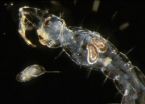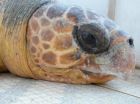(Press-News.org) Scientists have made an important step forward in their understanding of cryoprotectants – compounds that act as natural 'antifreeze' to protect drugs, food and tissues stored at sub-zero temperatures.
Researchers from the Universities of Leeds and Illinois, and Columbia University in New York, studied a particular type of cryoprotectants known as osmolytes. They found that small osmolyte molecules are better at protecting proteins than larger ones.
The findings, published in Proceedings of the National Academy of Sciences, could help scientists develop better storage techniques for a range of materials, including human reproductive tissue used in IVF.
Biological systems can usually only operate within a small range of temperatures. If they get too hot or too cold, the molecules within the system can become damaged (denatured), which affects their structure and stops them from functioning.
But certain species of fish, reptiles and amphibians can survive for months below freezing by entering into a kind of suspended animation. They are able to survive these extreme conditions thanks to osmolytes – small molecules within their blood that act like antifreeze –preventing damage to their vital organs.
These properties have made osmolytes attractive to scientists. They are used widely in the storage and testing of drugs and other pharmaceuticals; in food production; and to store human tissue like egg and sperm cells at very low temperatures (below ºC) for a long period of time.
"If you put something like human tissue straight in the freezer, ice crystals start to grow in the freezing water and solutes – solid particles dissolved in the water – get forced out into the remaining liquid.
This can result in unwanted high concentrations of solutes, such as salt, which can be very damaging to the tissue," said Dr Lorna Dougan from the University of Leeds, who led the study. "The addition of cryoprotectants, such as glycerol, lowers the freezing temperature of water and prevents crystallisation by producing a 'syrupy' semi-solid state. The challenge is to know which cryoprotectant molecule to use and how much of it is necessary.
"We want to get this right so that we recover as much of the biological material as possible after re-thawing. This has massive cost implications, particularly for the pharmaceutical industry because at present they lose a large proportion of their viable drug every time they freeze it."
Dr Dougan and her team tested a range of different osmolytes to find out which ones are most effective at protecting the 3D structure of a protein. They used an atomic force microscope to unravel a test protein in a range of different osmolyte environments to find out which ones were most protective. They discovered that smaller molecules, such as glycerol, are more effective than larger ones like sorbitol and sucrose.
Dr Dougan said: "We've been able to show that if you want to really stabilise a protein, it makes sense to use small protecting osmolytes. We hope to use this discovery and future research to develop a simple set of rules that will allow scientists and industry to use the best process parameters for their system and in doing so dramatically increase the amount of material they recover from the freeze-thaw cycle."
###
The research was funded by the UK Engineering and Physical Sciences Research Council, the US National Institutes of Health and the China National Basic Research Program.
For more information
Contact Hannah Isom
Press officer, University of Leeds
T: +44 (0)113 3435764
E: h.isom@leeds.ac.uk
Notes to editors
*The paper, 'Probing osmolyte participation in the unfolding transition state of a protein', by Lorna Dougan, Georgi Z Genchev, Hui Lu and Juilo M Fernandez is published in PNAS http://www.pnas.org/content/early/2011/05/23/1101934108.abstract.
*The 2008 Research Assessment Exercise showed the University of Leeds to be the UK's eighth biggest research powerhouse. The University is one of the largest higher education institutions in the UK and a member of the Russell Group of research-intensive universities. The University's vision is to secure a place among the world's top 50 by 2015. www.leeds.ac.uk
*The Engineering and Physical Sciences Research Council (EPSRC) is the UK's main agency for funding research in engineering and physical sciences. EPSRC invests around £800m a year in research and postgraduate training, to help the nation handle the next generation of technological change.
The areas covered range from information technology to structural engineering, and mathematics to materials science. This research forms the basis for future economic development in the UK and improvements for everyone's health, lifestyle and culture. EPSRC works alongside other Research Councils with responsibility for other areas of research. The Research Councils work collectively on issues of common concern via research Councils UK.
Scientists a step closer to understanding 'natural antifreeze' molecules
2011-06-24
ELSE PRESS RELEASES FROM THIS DATE:
Finding is a feather in the cap for researchers studying birds' big, powerful eyes
2011-06-24
BETHESDA, Md., June 23, 2011 – Say what you will about bird brains, but our feathered friends sure have us -- and all the other animals on the planet -- beat in the vision department, and that has a bit to do with how their brains develop.
Consider the in-flight feats of birds of prey: They must spot their dinner from long distances and dive-bomb those moving targets at lightning speed. And then there are the owls, which operate nimbly on even the darkest nights to secure supper in swift swoops. Some birds have ultraviolet sensitivity; others have infrared sensitivity. ...
Northern Rock Adds Helpful Savings Video Guide to its Website
2011-06-24
Northern Rock has added another helpful video guide to its interactive savings website to help consumers with their savings choices.
The video - Northern Rock's Guide to Savings - is the third guide in the series recently introduced by the bank to add a further dimension to its award-winning website. Existing videos include Northern Rock's Guide to ISAs and First Time Buyers Guide, which can be viewed on the Northern Rock website alongside the new addition.
The newest guide is designed to help customers make the most of their money in an accessible way, by highlighting ...
High technology, not low taxes, may drive states' economic growth
2011-06-24
High-tech training may trump tax breaks for creating more jobs and improving a state's economy, according to a team of economists.
"We found that lower state taxes were not statistically associated with a state's economic performance," said Stephan Goetz, professor of agricultural economics and regional economics, Penn State. "The tax climate was not linked to either growth or income distribution."
Goetz, who serves as director of the Northeast Regional Center for Rural Development, said states that favor low taxes do not necessarily spend funds efficiently. They may ...
Scientists uncover an unhealthy herds hypothesis
2011-06-24
Biologists worldwide subscribe to the healthy herds hypothesis, the idea that predators can keep packs of prey healthy by removing the weak and the sick. This reduces the chance disease will wipe out the whole herd, but could it be that predators can also make prey populations more susceptible to other predators or even parasites? Biologists at the Georgia Institute of Technology have discovered at least one animal whose defenses against a predator make it a good target for one opportunistic parasite. The research appears online in the journal Functional Ecology.
"We ...
Qld fruit fly scientists in race against time
2011-06-24
Parts of Australia's fruit and vegetable industry are under threat, with Queensland University of Technology (QUT) scientists racing to find new ways to control a major horticultural pest before chemical treatments are restricted.
Associate Professor Anthony Clarke, from QUT's Faculty of Science and Technology in Brisbane, is leading Australia's largest team of university researchers examining non-chemical based ways to fight fruit flies, including promising "lure and kill" techniques using ginger essence.
Professor Clarke, lead author of the largest ever review of ...
Cassini samples the icy spray of Enceladus water plumes
2011-06-24
The NASA/ESA/ASI Cassini-Huygens mission has directly sampled the water plumes jetting into space from Saturn's moon Enceladus. The findings from these fly-throughs are the strongest evidence yet for the existence of large-scale saltwater reservoirs beneath the moon's icy crust.
Enceladus' water plumes shoot water vapour and tiny grains of ice into space. They originate from the 'tiger stripe' surface fractures at the moon's south pole, and create the faint E-ring, which traces the orbit of Enceladus around Saturn.
The Cassini spacecraft discovered the plumes in 2005 ...
Debenhams Reveals Parents Need 'Nestoration' When Children Leave Home
2011-06-24
Debenhams has revealed that parents are stockpiling cash for investment in a range of household improvements after their children have gone to University in the autumn or left home, according to a poll carried out by the high street retailer.
Debenhams quizzed 1,000 parents with teens and asked them when they were likely to invest significant sums in redecorating or refurnishing their homes. The department store found that 74% of parents, battered by the costs of raising their kids, were planning to hold on to their cash and refurbish their homes after their kids have ...
Exeter study brings brain-like computing a step closer to reality
2011-06-24
The development of 'brain-like' computers has taken a major step forward today with the publication of research led by the University of Exeter.
Published in the journal Advanced Materials and funded by the Engineering and Physical Sciences Research Council, the study involved the first ever demonstration of simultaneous information processing and storage using phase-change materials. This new technique could revolutionise computing by making computers faster and more energy-efficient, as well as making them more closely resemble biological systems.
Computers currently ...
Exeter study reveals US turtles' movements
2011-06-24
A University of Exeter team has monitored the movements of an entire sub-population of marine turtle for the first time. The study confirms that through satellite tracking we can closely observe the day-to-day lives of marine turtles, accurately predicting their migrations and helping direct conservation efforts.
Writing in the journal Diversity and Distributions, lead author and University of Exeter PhD student Dr Lucy Hawkes (now at Bangor University) describes the migrations of a population of loggerhead turtles in the US Atlantic Ocean over a decade (1998�). ...
iFund Lending Announces New $2 Million Lending Facility for Entrepreneurs
2011-06-24
iFund Lending is pleased to announce that it has made an additional $2 million available in its lending facility for western Canadian entrepreneurs and companies requiring a prudent financing alternative to banks, credit unions and other alternative lenders. iFund Lending provides entrepreneurs with business loans, bridge financing, franchise acquisition, purchase-order financing, debt consolidation, re-mortgages, SR&ED and receivables factoring, and other proven asset-based alternative methods of financing. Borrowers are able to access between $25,000 and $1 million, ...


